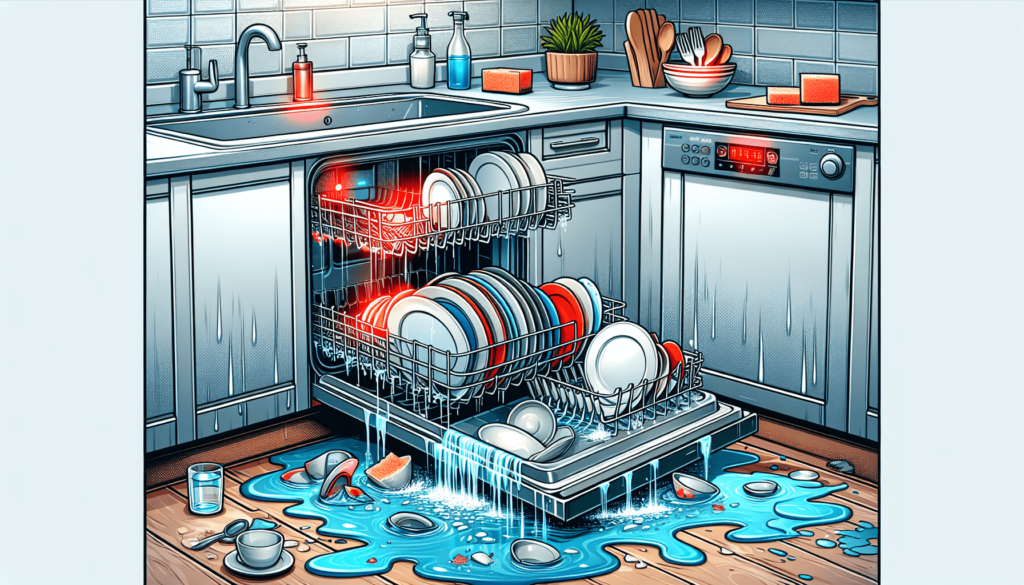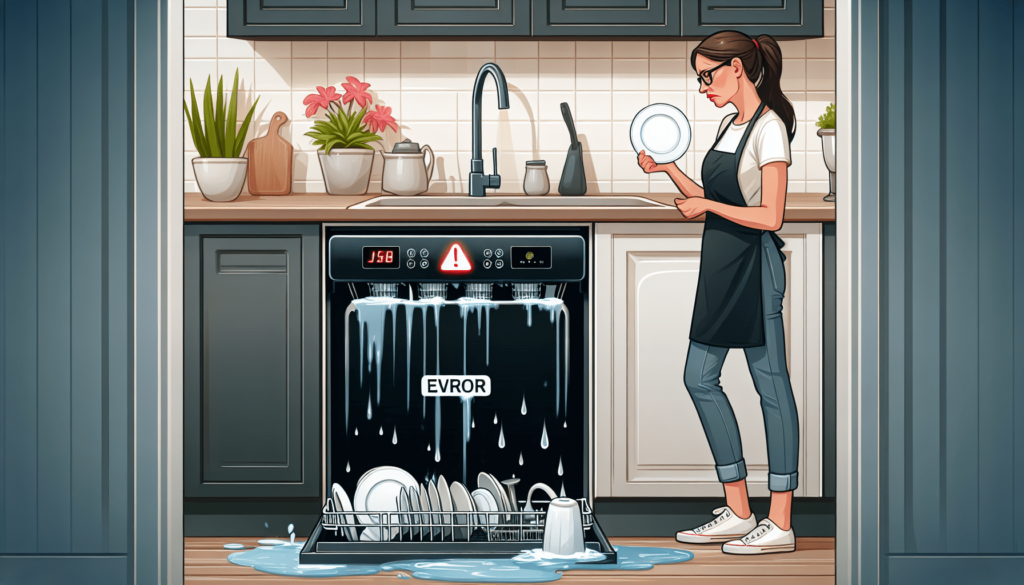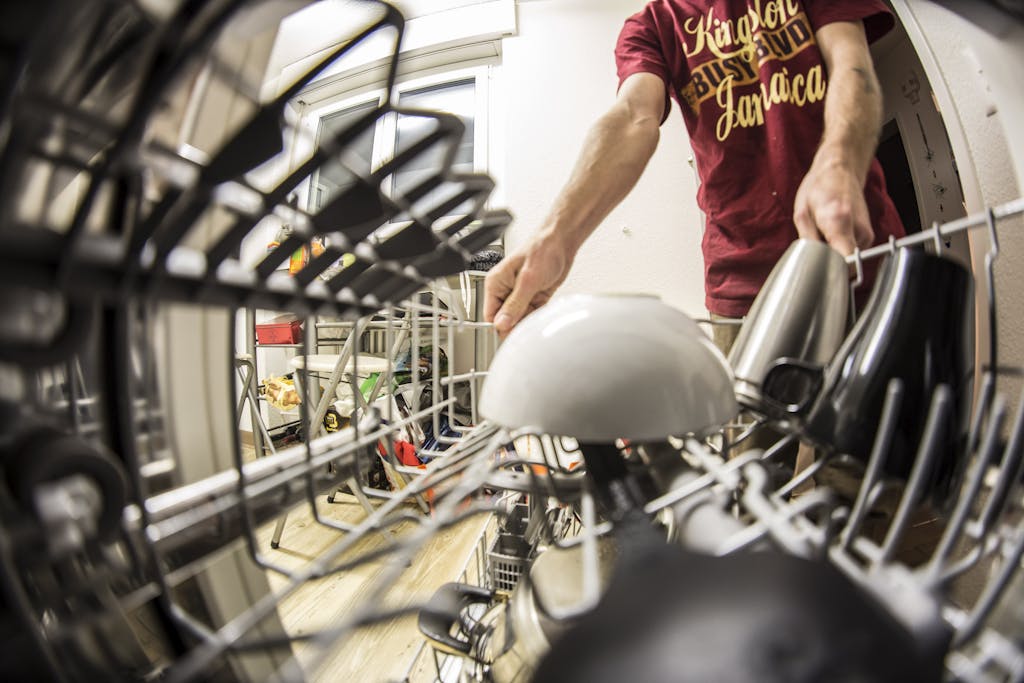Ever heard strange noises coming from your dishwasher while relaxing at your home in Athens? Or maybe your dishes aren’t getting as clean as they used to? Such issues might seem minor at first, but they can escalate quickly and indicate you need professional dishwasher repair. This guide will help you identify the tell-tale signs that your dishwasher needs expert attention.

Unusual Noises During Operation
Normally, dishwashers operate with a low hum, maybe the occasional clank of dishes. But any unfamiliar or loud noises might be a red flag.
Grinding Sounds
If your dishwasher sounds like it’s grinding food, it could mean that debris is stuck in the filter or spray arm. Regular cleaning might help, but persistent noise likely points to a larger issue, like a malfunctioning motor or pump.
Rattling Noises
Rattling can indicate loose parts or that something is lodged in the spray arm or chopper blade. It’s often something you can check yourself, but if the rattling persists, a professional diagnosis is necessary.
High-Pitched Whine
A high-pitched whining noise is usually a sign of an issue with the water inlet valve or the motor. Both of these components are crucial for your dishwasher’s operation and can require professional repair or replacement.
Water Leaks and Puddles
Water should remain inside your dishwasher. If you start noticing puddles around it, something’s definitely up.
Door Seal Issues
A worn or damaged door seal is a common cause of leaks. While replacing a seal might seem easy, ensuring a proper fit is key and might warrant a professional’s touch.
Faulty Water Inlet Valve
The water inlet valve controls the flow of water into your dishwasher. If it becomes defective, it can cause water to leak out during cycles. This generally requires professional replacement.
Blocked or Damaged Hoses
Hoses can get blocked or damaged over time. You might see water pooling if there’s a tiny crack or if the hose has come loose. A professional can inspect and replace them if needed.
Poor Cleaning Performance
Your dishwasher’s primary job is to clean your dishes. If it’s not doing that effectively, there may be underlying problems.
Spray Arm Issues
The spray arms spin and spray water to clean your dishes thoroughly. If they’re clogged or not spinning correctly, your dishes won’t get clean. Regular maintenance can help, but if the problem persists, a professional check-up is advised.
Filtration Problems
The dishwasher filter traps food particles and prevents them from recirculating. When clogged, it can’t do its job effectively. Cleaning the filter might help, but sometimes a replacement is necessary.
Detergent Dispenser Problems
If the detergent isn’t being released properly, your dishes will remain dirty. The dispenser might be broken or malfunctioning, which usually requires professional repair.
Dishes Aren’t Drying Properly
Opening the dishwasher to find wet dishes is disappointing. Various issues could be at play here.
Heating Element Failure
The heating element dries your dishes by heating the water during the final rinse. If it’s not working, your dishes won’t dry properly. Replacing a faulty heating element is best left to a professional.
Rinse Aid Dispenser Problems
Rinse aid helps water evaporate off the dishes. If the dispenser isn’t working right, your dishes might come out wet. This can be a tricky issue requiring professional attention.

Persistent Drainage Issues
If water is pooling at the bottom of your dishwasher or not draining at all, there’s a serious issue you need to address.
| Problem | Possible Cause | Action Needed |
|---|---|---|
| Clogged Drain Filter | Food debris stuck in the drain filter | Clean the filter |
| Blocked Drain Hose | Hose is blocked or kinked | Inspect and un-kink hose |
| Faulty Pump | Pump isn’t working properly | Professional repair |
Clogged Drain Filter
The filter should be cleaned regularly to prevent drainage issues. However, if this doesn’t resolve the problem, something more severe might be wrong.
Blocked Drain Hose
Check if the hose is clogged or kinked. If it’s something simple, you might be able to fix it yourself, but persistent issues suggest a professional should take a look.
Faulty Pump
The pump is responsible for moving water out of the dishwasher. If it’s faulty, drainage will be an issue. This is a more complex issue that usually calls for professional intervention.
Electrical Issues
Electrical problems are nothing to scoff at and can be quite dangerous.
Dishwasher Won’t Start
If your dishwasher doesn’t start, it could be an issue with the power source or the control panel. While you can check for a tripped circuit breaker, anything beyond that should be handled by a professional to avoid electric shock or further damage.
Intermittent Power
Intermittent power might indicate a loose wire or a faulty power supply. Again, electrical issues should usually be left to professionals.
Foul Odors
A foul smell coming from your dishwasher is not only unpleasant but can also indicate an underlying problem.
Food Debris Accumulation
Food particles can get stuck in the slits of the spray arms or drain filter, leading to bad smells. Regular cleaning can help, but persistent odors might need professional attention to diagnose and fix.
Mold and Mildew
Mold and mildew can form in places you can’t see, like hoses or the spray arm assembly. Professionals have the tools to clean or replace these parts effectively.
Control Panel Issues
The control panel is the brain of the dishwasher. If it’s malfunctioning, you’ll face various issues.
Buttons Not Responding
If the buttons on your control panel aren’t responding, it could be due to water damage or electrical components failing. Either way, it’s best handled by a professional.
Error Codes
Modern dishwashers display error codes to signal specific issues. Interpreting these codes and fixing the underlying problem often requires professional expertise.
Inefficient Operation
If your dishwasher is taking longer than usual to complete a cycle or is using more water and energy, it could be due for a repair.
Timer Problems
The dishwasher’s timer controls how long each part of the cycle runs. If it’s malfunctioning, the operation becomes inefficient. Replacing or repairing the timer is a job for a professional.
Sensor Issues
Dishwashers have various sensors that help them run efficiently. If these sensors are faulty, the dishwasher can over-use water and power. Diagnosing and fixing sensor issues often requires professional skills and tools.
Water Temperature Issues
The temperature of the water in your dishwasher is crucial for cleaning and sanitizing dishes.
Thermostat Failure
A faulty thermostat means the dishwasher can’t regulate water temperature effectively. If the water is too cold, dishes won’t get clean. Too hot, and you risk damaging dishes. This problem usually calls for professional repair.
Heating Element Problems
We’ve covered heating element issues regarding drying, but they also affect the water temperature. If your water isn’t getting hot enough, it’s likely an issue with the heating element.
Frequent Cycle Interruptions
If your dishwasher stops mid-cycle, it’s both inconvenient and a sign of trouble.
Loose Door Latch
A loose door latch can stop the washer mid-cycle. While a simple issue, it might need professional adjustment to ensure it locks securely.
Malfunctioning Timer
A malfunctioning timer can also cause the cycle to stop unexpectedly. Fixing this often requires professional help.
Conclusion
Recognizing when your dishwasher needs professional repair is crucial to prevent small issues from turning into expensive problems. From unusual noises to water leaks, poor cleaning performance to electrical issues, knowing the signs means you can call in the experts at the right time. By tackling these problems early, you not only extend your dishwasher’s life but also ensure it runs efficiently and effectively. If you identify any of these signs, contacting a professional is your best way forward.
